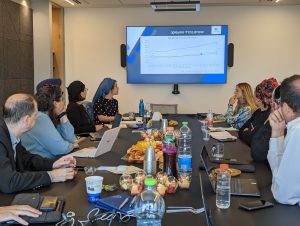Representatives of the Authority for Economic and Social Development of the Haredi sector in the Prime Minister’s Office, the Ministry of Interior, representatives of Haredi municipalities and employment and research organizations participated today (Monday) in a joint brainstorming session held by the Haredi Institute for Public Affairs, on the topic of finding effective tools for the local authorities for a quality integration of the Haredi public in the labor market.
The round table was held following three employment studies conducted by the Haredi institute in the three largest Haredi cities: Jerusalem, Bnei Brak and Beit Shemesh. The studies identified that each population, in each city, has unique needs and characteristics.
The main conclusion emerged from the studies is that there is a great advantage in local occupational thinking and planning, by the municipal authorities who know how to identify those unique needs and characteristics. The decentralization of powers will help the central government to be more focused, more flexible and more accurate in identifying the needs and characteristics of the various groups in the population and working with them.

After a series of meetings between the researchers of the Haredi institute and representatives of the government ministries, it was decided to hold a brainstorming session together with the participation of representatives from the government ministries, the authority for economic and social development of the Haredi sector in the Prime Minister’s office, representatives of local authorities and relevant third sector personnel.
Among the participants in the round table held today at the offices of the Haredi Institute for Public Affairs in Jerusalem, under the title “Decentralization of powers to the local government to manage regional employment”: Roi Assaf, head of the Authority for Economic and Social Development of the Haredi Sector in the Prime Minister’s Office; Yechiel Amoyal, director of “Kivun” center; Eliyahu Wind, Head of Haredi Employment Division at the Jerusalem Municipality; Esti Moskovitch, Head of Employment Directorate in Beit Shemesh and other representatives from local authorities.
Yehudit Miletzky, senior researcher at the Haredi institute, who was behind the studies and initiated the move with the government:
“In order to improve the rate of integration of Haredi men into the labor market and to improve the quality of employment for Haredi women, the tools for entry into quality employment must be adjusted. The occupational studies we have carried out in the last two years in Bnei Brak, Jerusalem and Beit Shemesh illustrated the great difference and the need in municipal and regional employment planning. The local authorities have a better ability to respond to local employment needs, therefore they should be given more tools and powers for local employment planning – this is in accordance with the diversity, the differences in opportunities, needs and challenges that exist in each municipality.”


